
Piecing together the values of Peace
Positive Peace Ethiopia is a youth-led civil society organization built on a strong commitment to peace, justice, and human rights in the entire country of Ethiopia. PPE works through its 17 regional chapters involving the youth and women in peacebuilding, conflict resolution, and social integration activities.
PPE has considerable experience in community mobilization and is implementing notable projects like #defyhatenow Ethiopia which is geared towards hate speech and digital peacebuilding, as well as women empowerment initiatives such as EmpowerHer. Moreover, PPE is also a strategic partner with the Ministry of Peace of Ethiopia (MoP) and acts as the Focal Organization of the Civil Society Platform for Peacebuilding and Statebuilding (CSPPS). PPE is also the only UNOY (United Network of Young Peacebuilders) representative in Ethiopia, which is a global network of youth-led organizations located in The Hague - also member of CSPPS.
Positive Peace Ethiopia is built upon establishing a strong foundation of peace, justice, and community resilience. Our journey began with the need to deal with the polarities and the inequalities that we observe within our communities. PPE was set up to enable the youth and women whom we strongly believe in their ability to change the negative narratives.
This commitment is both personal and practical. We are impelled by the sense that if properly equipped, educated, and engaged, the youth of Ethiopia can be an instrument of peacebuilding. The development of any program, the establishment of any partnership, and the training of any young person take us further towards attaining our goal of a peaceful and resilient Ethiopia.
The Challenges of Misinformation and Disinformation in the socio-political Context
Ethiopia is a country with extraordinary diversity, home to over 80 ethnic groups each with its own rich cultural heritage and practices. Ethiopia’s diversity is its strength, but it also presents challenges. In the recent past, the interplay of ethnic politics has at times ended up creating unpleasant situations, and the role of misinformation and disinformation has increased to the extent of being used in dividing people, creating suspicion and conflict in some areas. In this landscape, misinformation is not just a digital challenge, it has become a weapon that threatens the peace of the country.
The country is currently navigating a complex political environment characterized by social, ethnic, and political tensions. In recent years, as a country, we have suffered recurrent episodes of violence, including armed conflict and ethnic disputes, that have disrupted society. The situation is aggravated by the rapid diffusion of, often highly politicized and exaggerated, “information”, that fuels up emotions and raises the levels of tensions. In Ethiopia, disinformation tends to promote suspicions, polarizations, and in some cases violence, and, therefore, is an issue that requires urgent intervention.
The role of youth and women
Based on population projections of the Ethiopia Central Statistical Agency (CSA) for 2016, adolescents and youth in the age range of 10 to 29 years old, are numbered 38,545,711 (19,466,543 males and 19,079,177 females). With that, we can say that the youth and women make up a significant portion of the population and have great promise to influence social change. In many cases, however, they are marginalized in both political and economic spheres. Problems related to unemployment among the youth are rampant. The quality of education is lacking and job opportunities are hard to find, while there is social unrest aggravated by ethnic tensions. This, in turn, hinders any attempts made towards the reasonable growth and development of young people.
Women in Ethiopia face serious challenges, including Gender Based Violence, underrepresentation in peace processes, and being subjected to patriarchal norms that limit them from taking leadership and conflict resolution positions. On the other hand, structural barriers in relation to resource access and inadequate support for justice limit them from interfering in peacebuilding and strengthening the communities. Such issues, among others, underscore the reason why empowering women is an essential part of Positive Peace Ethiopia’s mission as we are engaging in their integration efforts towards establishing and developing peaceful societies.
Though misinformation affects all strata of society, its effects are more pronounced in the populations that are illiterate or cannot access information verification. This creates a ground for many unconstructive tendencies, such as repetitions of the same lies and discontent contributing to the already restless regions. The impact of the spread of false information can go as far as creating misconceptions concerning a given political situation or particular ethnic groups, which threatens the peace-sustaining process at regional and national levels.
Youths are the core of our organization’s agenda. Thus, through projects like the Entoto Peace Walk and the University Peace Ambassadorial programs (UPAP), we bring together youths from different areas of the country and make sure they engage in peace dialogues, community development, and peace advocacy. In this way, rather than engaging the youth and promoting peace at all costs, we expect them to grow into a generation that will preach peace but most importantly, critical thinking and social accountability.
“When the youth are engaged and conducted with respect, they turn out to be the peacebuilders in the society they live in. This keeps their hope alive; it is not merely working for peace - we are making it happen.”
The Entoto Peace Walk
What is the Entoto Peace Walk? It is a project driven and practiced by the youth aimed at promoting peace through physical activity and engaging conversations. Taking place in the green and beautiful Entoto Park, this event engages 35 young volunteers for a hike and talks based on the topics of resilience, social justice, and engaging the youth towards peacebuilding. This encourages health, but also physical bonding, and gets the participants to take responsibility for peace efforts within their societies.
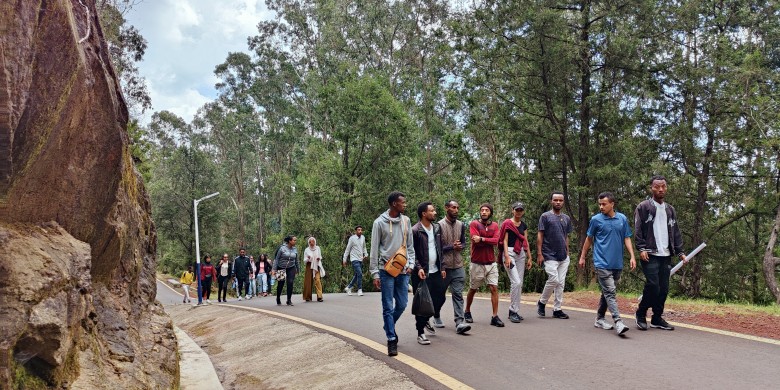
Regional Chapters as UPAP
The Regional Chapters that we organize, is about bringing positive change and messages of peace in all 14 regions of Ethiopia. Through our regional chapters, we have recruited and selected 17 Peace Ambassadors as focal persons bringing students and local communities into the regional extension of our activities under our University Peace Ambassadorial Program. These focal persons engage in dialogue and advocacy that goes beyond the campus, by organizing peace clubs, among other activities, to motivate the young people to speak out for peace. Using faculty members as the focal point helps us to enhance the program’s sustainability by providing consistent leadership, even as the student populations evolve. This approach further addresses our objective of building and maintaining peace campaigners and resilient communities throughout Ethiopia.
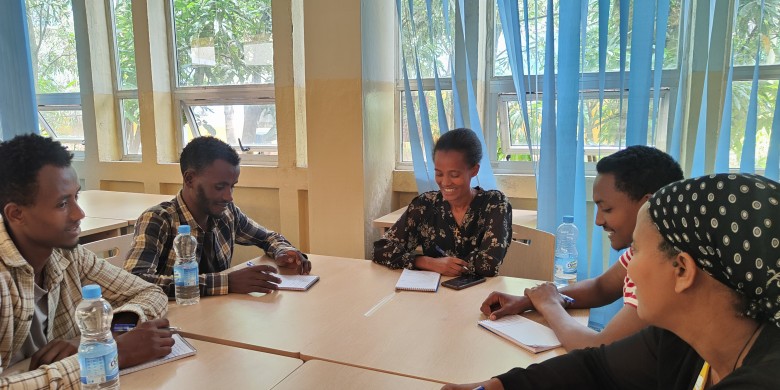
Our current Programs
Positive Peace Ethiopia’s current activities are focused towards responding to the increasing threat of misinformation and disinformation, which has been incorporated into the search for conflict resolution and social cohesion in Ethiopia. The fight against these challenges is one of our fundamental objectives. We seek to empower people with critical skills, to help achieve that goal, through an EU-funded project we are currently implementing with a partner organization. The project includes both a Fact-Checking Fellowship and Women’s Online Safe Spaces among other sub programs.
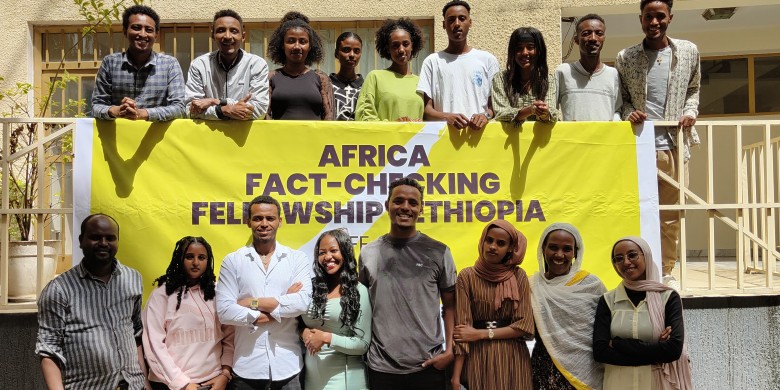
The Fact-Checking Fellowship is an initiative designed within three months – targeted at priming Ethiopians on the skills of identification, verification, and rebuttal of false information. Trainees go through extensive training in fact-checking tools and strategies, which assist them in becoming exceptional practitioners of spotting misinformation in the current widespread media. Graduates of the program have engaged their community members and imparted them with the concept of media literacy, along with combating misinformation. Our fifteen alumni proved to be effective fact-checkers after completing the three-month course that covered key skills in identifying, verifying and debunking misinformation. Throughout the program, they were tested with different claims to test their fact-checking skills and usage of fact-checking tools, proving their readiness to apply these skills in their communities and guide others in media literacy. They have already started to reach out and extend their impact by teaching the grassroots communities the lessons they acquired through local meetups, training people on media literacy, and forming Media Information Literacy (MIL) clubs in secondary schools to help roll out the program further in the communities they live in.
Misinformation and disinformation in the business sector: Besides our current projects, in a partnership with CIPE, we recently hosted a one-day workshop on mis/disinformation and its effects on Ethiopia’s business sector, a topic relatively overlooked in the promotion of digital literacy and impacts of mis/disinformation. This workshop allowed participants to speak about the threat of mis/disinformation on the integrity of businesses and the trust of consumers, as well as how this can affect the economy and mitigation strategies. The topics discussed in the workshop have, to some extent, guided our looking into the possibility of pursuing more interventions in this sphere.

The Women’s Online Safe Spaces initiative is focused on helping women in every corner of Ethiopia learn about and exchange ideas on important issues without fear in three relevant themes:
Media and Information Literacy (to identify and deal with mis/disinformation and understanding the role of healthy media in society), Cybersecurity and Online Safety (to provide security for women within the cyberspace), and Gender-Based Violence and Mental Health (tackling issues of digital disinformation regarding GBV and trauma healing and resilience after conflict). This program imparts important information and assistance to the participants which enables them to use the internet without fear and fight for their rights. Such empowerment has a ripple effect as most of them teach others within their households and communities.
Learning objectives in each thematic area aimed at different groups of women and allowed for frequent, active, and safe learning sessions. At the end of the three-month program, we organized a reflection session in person for all participants. All groups shared experiences and learned from the experiences of others. Action plans were presented by the participants in which they explained how they would apply the knowledge acquired for the good of their own communities, making sure that the coverage of the program did not end at the first cohort only.
That is why through these activities, PPE is already addressing misinformation in several ways, helping and equipping people to think critically and become conscious leaders, able to contain the harmful information and contribute to a more peaceful Ethiopia.
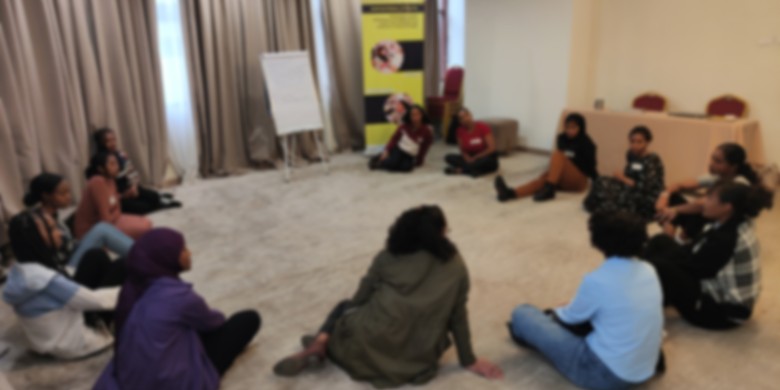
EmpowerHer Program
Apart from the mis/disinformation spectrum, the EmpowerHer program aimed to transform women entrepreneurs' business environment by providing them with the appropriate skills, knowledge, and resources including the digital ones. In partnership with the Center for International Private Enterprises (CIPE), we provided training on e-business, digital marketing, and business management for 30 women entrepreneurs in Addis Ababa, and its surroundings including women from the PWD community. Along with workshops conducted by experts, the program provided mentorship, which aided the women in expanding their businesses, but also included peacebuilding elements, so as to ensure economic and social rebuilding for the long haul. With this assistance in place, we are committed to women’s empowerment, community building, and contributing to the positive transformation of society in the digital age.
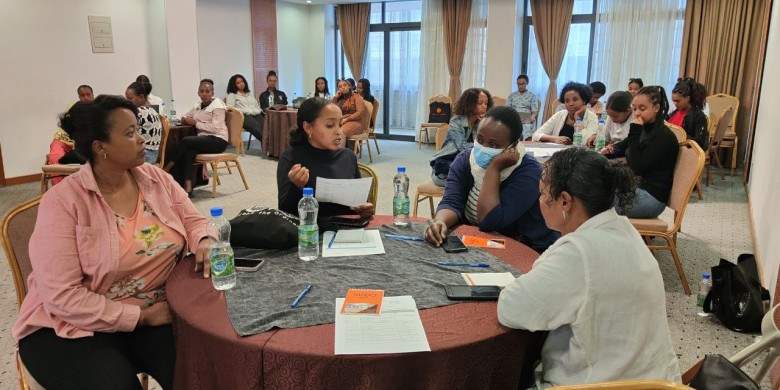
Multilayered engagement
To help sustain and scale up our peacebuilding work in the long term we are primarily working with different stakeholders based on their level of intervention:
Community Leaders: We work with promising community members to help rally support for initiatives spearheaded by young people and women, ensuring that the outreach about peace and the use of the digital space is done at the grassroots level.
Educational Institutions: Schools and Universities are important allies in nurturing and informing the future generation. We have created 17 regional chapters by selecting focal persons in government universities within all regions of the country. Currently, we are working on engaging more schools to amplify the voices of peace and to take our work to high schools.
Government and Policy Makers: We aim to engage the legislators in coming up with legislative frameworks that will focus more on initiatives for the youth, digital skills, and combating fake news.
International Organizations: Partnering with local actors, as well as foreign like-minded organizations has benefits in terms of providing necessary resources, exposure, and backing for the growth of our initiatives.
Challenges faced and how we encountered them
Consistent funding has remained an uphill task for us. As a grassroots, youth-led civil society organization (CSO), donor agencies are often not able to guarantee our abilities to run projects, which threatens our continuity. As a solution to this, we started engaging with well-established International Non-Governmental Organizations (INGOs) and working on projects together as a show of good faith. In addition, there have been challenges associated with the complex environment of laws and regulations. To this end, we secured an innovative collaboration with the Ministry of Peace, which allowed us to work with technical advisors who help implement our activities and also assist us in meeting the regulatory standards.
Message to the International Community
To the international community, we emphasize the need for continuous support for youth and women-led peacebuilding efforts which takes into consideration the phenomenon of equity, social justice and community resilience. However, it is worth noting that Ethiopia’s problems, be it issues of misinformation, political tension and under-utilization of its young men and women, are not isolated issues, but rather global struggles encountered by different societies across the world. Our experience has shown that while theory and practice seem different, if young women and men are enabled to self-advocate and challenge injustices, they can be among the strong brackets that can drive the nation towards stable growth. We also want to note that peace is a cross-cutting issue that touches up on all aspects of the society.
We call on the international community to trust in youth-led organizations like ours to help us promote programs that teach young people how to analyze issues objectively, open pathways for youth and women’s economic independence and enhance the level of peace from the grassroots. Youths are uniquely positioned to engage at the grassroots level bringing energy and creativity with a deep understanding of local challenges. By working together, we can make a much stronger, unified and peaceful society, an outcome that can resonate with communities worldwide.
For more information about Positive Peace Ethiopia, check out the following links:
LinkedIn: Positive Peace | Ethiopia
Facebook: www.facebook.com/pp4eth
Instagram: https://www.instagram.com/positive_peace_ethiopia
